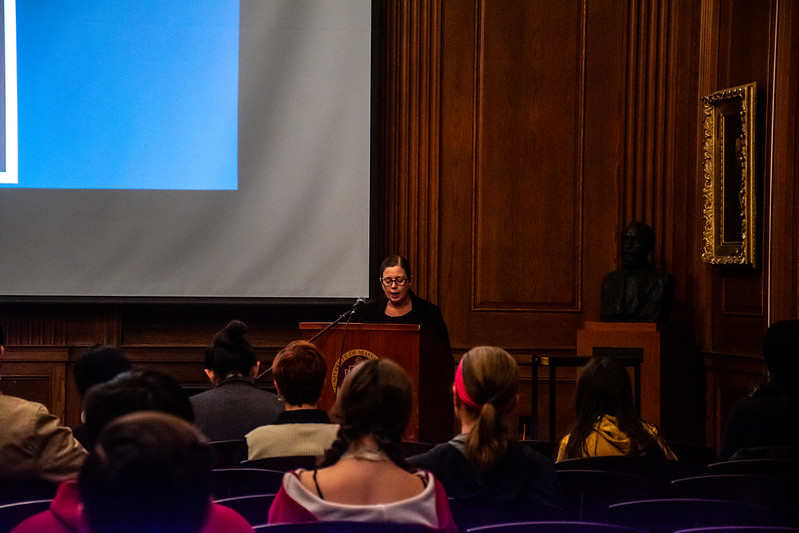On Nov. 10, the University of Massachusetts hosted Jenny Brown for the lecture, “Abortion and the Hidden Fight Over Reproductive Work” in Goodell Hall. The talk was sponsored by UMass’s Social Thought and Political Economy (STPEC) program.
Jenny Brown is an organizer with the feminist group National Women’s Liberation. She was a leader of the grassroots campaign to make the morning-after pill available as over-the-counter contraception in the U.S. In addition to her work as an activist, she is the author of “Birth Strike: The Hidden Fight over Women’s Work,” and “Without Apology: The Abortion Struggle Now.”
The lecture began with a welcome from Hoang Pham, associate English professor and director of the STPEC program at UMass. Pham said that this event was the first “STPEC at 50” event of the year. The series aims to celebrate the 50 years since the program’s creation in 1972.
Katherine Moos, an assistant professor of economics at UMass, provided an introduction for Brown, the featured speaker. “[Brown provides] a unique contribution to political literature on abortion,” Moos said. “I’m so thrilled she is here.”
Brown then took the stage for an hour-long lecture. The talk primarily focused on material from her most recent book, “Without Apology: The Abortion Struggle Now.” Brown emphasized, “[These are] not my ideas alone…they were developed in National Women’s Liberation [and other organizations].”
Brown began by speaking about her work in making the morning-after pill an over-the-counter medicine. “To read the [rhetoric] surrounding it, you would’ve thought it was the most dangerous drug in America,” she said. Before the morning-after pill was widely available at pharmacies, it required a prescription from a doctor. Since the pill needs to be taken within 120 hours after unprotected sex, people were not always able to procure a prescription in time.
“[The prescription requirement] meant a comical rush…in time for it to be effective,” Brown said.
In 2013, the morning-after pill was made an unrestricted over-the-counter drug. “[The pill] was available to all ages, which was really important to us, and genders,” Brown said.
Brown went on to discuss her opinions regarding the rhetoric surrounding abortion in the U.S. “Abortion is wrongly being classified as a cultural issue,” she said.
From Brown’s perspective, anti-abortion laws are meant to increase birth rates. “[We need to] recognize the battle is not at its base over religion, prudishness or punishing women for having sex… it’s about reproductive labor,” Brown said.
“The main enemy is not people who think abortion is wrong ethically… the main enemy is the power structure determined to get our work for cheap,” she said.
Brown cited several people who believe that economic growth is a result of higher birth rates. She quoted “The Empty Cradle: How Falling Birthrates Threaten World Prosperity” by Phillip Longman. In his book, Longman says, “Capitalism has never flourished except when accompanied by population growth.”
Brown also addressed factors of the U.S. healthcare system which make it difficult for those who want multiple children to have them. “I remember [in 2016 my colleagues and I] discovered that most of us had stopped at one child because we found it to be too difficult…” Brown said. “One woman testified it was like the water was up to her neck with one child, and another child would be like drowning.”
“We see [the problem] as something we individually did wrong, rather than seeing it as a system that requires our unpaid labor to function,” Brown said.
She then brought her lecture to the present day, in the wake of Dobbs v. Jackson Women’s Health Organization. Dobbs is a 2022 Supreme Court decision that overruled Roe v. Wade, the landmark 1973 decision that formerly established federal access to abortion.
“It’s tempting to want to go back to the situation before Dobbs, but we all know that was not good enough and was way behind what other countries have,” Brown said.
Brown concluded by discussing next steps for the reproductive rights movement. “Abortion is our right to strike against reproductive conditions… it’s time to defend on that basis instead of individual choice rhetoric,” she said.
Brown noted, “we need to organize a broad front” and listed three terms for reproductive justice: the right to have a child, the right to not have a child and the right to have a child in safe and healthy environments.
Mia Vittimberga can be reached at [email protected] and followed on Twitter @MiaVittimberga.


















